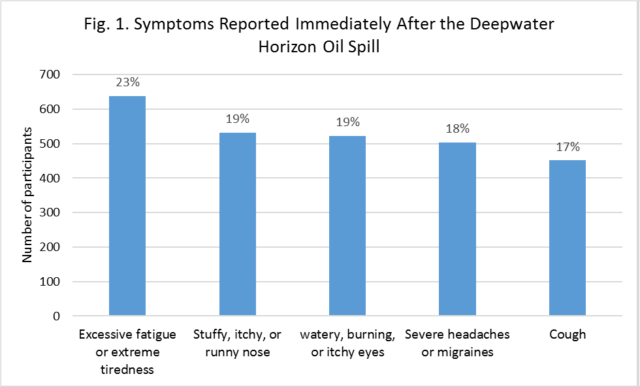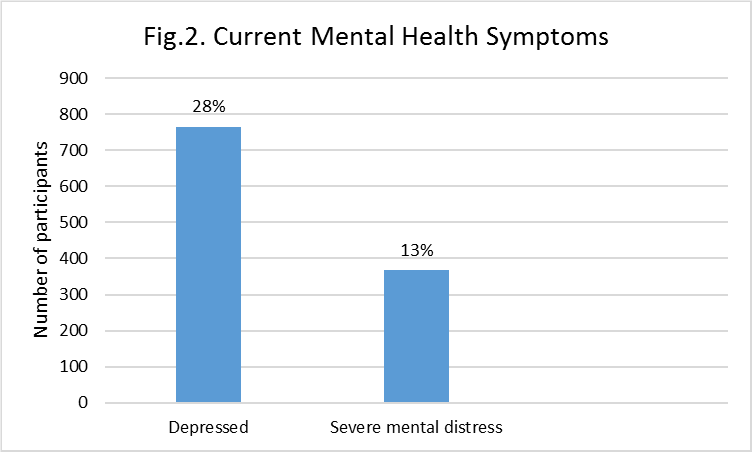Physical Health
Immediately following the Deepwater Horizon oil spill, many of you reported feeling a variety of acute physical symptoms. Excessive fatigue (23% of you reported this), stuffy/runny nose (19%), watery/burning/itchy eyes (19%), severe headaches (18%), and cough (17%) were the most common symptoms reported (see Figure 1). Those of you who reported more of these symptoms were more likely to have been exposed to the oil spill.

Mental Health
Over a quarter of you (28%) reported feeling depressed in the past week, and 13% of you reported symptoms of severe mental distress (see Figure 2). Domestic conflict was another issue of concern. 16% of you with partners reported an increase in the number of fights with your partner, and 11% reported an increase in their intensity. All of these conditions were related to both economic and physical exposure to the oil spill.

Depression and Social Capital and Social Support
Social capital has to do with how you interact with others in your community. We found that those of you who participated more in neighborhood organizations (what we call “structural social capital”) tended to feel more of a sense of community and cohesion (what we call “cognitive social capital”), which led to feelings of greater social support. All of these things tend to lead to less depression. But the oil spill, specifically the economic consequences of it, negatively affected those feelings of community and social support, leading to higher levels of depression.
To read more, click here:
Rung AL, Gaston S, Robinson WT, Trapido EJ, Peters ES. Untangling the Disaster-Depression Knot: The Role of Social Ties After Deepwater Horizon. Social Science & Medicine 2017 dx.doi.org/10.1016/j.socscimed.2017.01.041.
Wives of Workers Study
This study enrolled 252 wives or female partners of men who participated in the GuLF STUDY. These women lived in coastal Louisiana parishes between 2011 and 2013. 31% of them reported symptoms of depression, 33% reported increases in domestic fights, 31% reported memory loss post-spill, and 39% reported an inability to concentrate post-spill. All of these conditions were associated with greater total exposure and greater physical exposure to the Deepwater Horizon oil spill. Domestic fights with partner and memory loss post-spill were also both related to greater economic exposure to the oil spill.
To read more, click here:
Rung AL, Oral E, Fontham E, Harrington DJ, Trapido EJ, Peters ES. Mental health impact of the Deepwater Horizon Oil Spill among wives of clean-up workers. Epidemiology 2015;26(4):e44-e46.
Depression Methods
We explored other ways to analyze the questions related to depression by using a method called latent profile analysis to try to better understand patterns of responses. We found that women fell into three groups: those with no depression, those with occasional depressive symptoms, and those with severe depressive symptoms. These results supported the conventional use of the depression screening tool. We also found that women with the most severe depressive symptoms tended to not have completed high school, have a lower household income, and have less social support. They also tended to report more damage to areas they fished commercially, to have experienced more economic consequences from the oil spill, and to have smelled the oil more often than women who reported fewer depressive symptoms.
Neighborhoods and Obesity
Those of you who reported living in more unfavorable neighborhoods (e.g., dirtier, noisier, more visible trash and graffiti, poor condition of streets, abandoned cars or buildings) were more likely to have a higher body mass index (BMI, a measure of obesity).
Resilience
The Resilience Working Group of the Gulf Coast Research Consortium developed a conceptual framework to serve as the basis for testing how access to social resources, such as formal and informal social support and assistance, can promote positive adaptation or reduced psychopathology among individuals and communities exposed to the acute collective stressor of a technological disaster such as the 2010 Deepwater Horizon Oil Spill.


